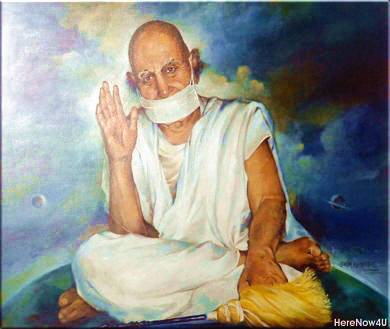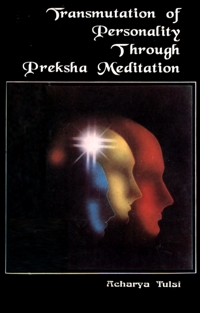
Pure environment fills a man with bliss;
Then shine upon him forever the alpha rays undimmed!
Unclean environment makes for rising melancholy;
There doubtless beat mostly the beta vibrations!
The task of conveying the atom up to the soul,
The cycle of leshya tirelessly performs!
From the purity of the aura or the cycle of feeling, mental peace ensues. Who experiences this bliss? Does only the man to whom peace has come experiences it, or is it possible for another man also to have some understanding of it? Is there a parameter to measure mental peace or mental agitation?
There exist many old ways of measuring the tranquillity of the mind or its agitation. A man's facial expression or his conduct does indicate whether he is at peace or lost in confusion. In the modern age many scientific devices have been developed to assess a man's inner condition. Electrical machines take a graph of the vibrations in the brain and on the basis of such graphs, the state of peace or disquiet can be ascertained. The mental condition of an individual can also be known on the basis of cerebral vibrations during sleep or the dreaming state.
Tranquillity is found where the environment is clean and there is a preponderance of alpha rays. In other words, wherever the vibrations of the alpha rays are active, there can be no disquiet. Mental agitation or gloom are symbolised by beta-vibrations. Alpha vibrations and mental peace are found only in a clean and pure environment. When the environment is defiled, there are no alpha vibrations, nor mental peace. With the help of electrical devices it is possible to study an individual's state of mind or his environment and to determine whether he is at peace or in turmoil.
How do we determine in what kind of environment does a particular individual live? What is an individual's state of mind? Where are to be found the alpha vibrations and which man is happy or unhappy? What is the utility of knowing all this?
Many times a man is mistaken in understanding his own defect. A man cannot himself see his own weakness, but others are able to grasp it immediately. A sick man goes to a doctor. Such a visit has two objectives - a correct diagnosis of the disease and its treatment. However, some patients, after getting their disease diagnosed by one doctor, seek another diagnosis from a second doctor, or even from a third. Their purpose in later visits is not to get any treatment, only to verify and confirm if the diagnosis made by the first doctor is correct. But even for this they are required to consult two additional doctors. It is certain that the patient will not get himself treated by the 1ater physicians, still consultation is done with them for his mental satisfaction. However this makes it clear that the diagnosis and the treatment are two different things. To know is one thing, and to suggest a remedy quite another.
It is only after knowing the defects of the soul that a way of purifying it is sought. That indeed is the objective of the biofeedback system. Experiments in this connection are in progress at many places in the western countries. With the help of an instrument an individual's state of mind is known. His voice reveals many of his habits. Any man could call himself a great meditator or sadhak, but the instruments clearly reveal how deep his meditation is and what stage his sadhana has reached. This information is not meant to ridicule him, but to suggest ways of making further progress. Experiments with auto-suggestion etc., are a step in this direction.
The essence of this statement is that the diagnosis and the treatment cannot be separated. If they are separated, desired results wouId not accrue. Similarly, the diagnosis of feelings is made on the basis of the aura. After a correct diagnosis is made, the process of transformation of feelings is initiated with the help of preksha and anupreksha (concentration of perception and contemplation) etc. These experiments have been tried and tested. Those participating in these exercises with devotion and regularity, have experienced a change within themselves.
Karma is the cause of the defilement of the soul. Is there a method of forestalling the effect of karma, so that the soul remains unaffected and pure?
The soul and the karma - between the two lies the bridge of leshya. Without crossing this bridge no atom of karma can reach the soul. The Jain Agamas contain an elaborate treatment of this subject. It may even be asserted that about 25 percent part of Jain Agamas deals with leshya. The more shabby, unclean the leshya is, the more defiled and perverted the soul would be. Therefore, the purity of the soul is dependent upon the purity of leshya or the aura.
What is the method of making Leshya pure or good?
We just mentioned the biofeedback system. After ascertaining facts through this systems the right kind of feelings can be evolved. When the impact of good feelings is felt by the karma-vibrations, nirjara (the dissolution of past conditioning) takes place. With the dissolution of past conditioning, feelings become pure and karma-vibrations are refined. With the refinement of karma-vibrations, pure feelings arise. It is possible to keep leshya pure through the purification of feelings, conduct and behaviour.
The development of feelings like humility, steadfastness simplicity and non-greed, etc. makes leshya good, and when leshya is good, these feelings develop. In a way this constitutes a cycle. Now what kind of aura has a particular man? Apart from the information acquired through the electrical devices, a man's behaviour also is revelatory. Conduct marked by cheerfulness, tranquillity, patience, tolerance etc., is a proof of good leshya, whereas peevishness, impatience, insolence, etc. are culminations of unclean and imperfect leshya.
Which feeling is the culmination of which leshya, can be known on the basis of one's conduct and it is possible to change an inauspicious feeling. Why are then no experiments done with the students? Their contumeliousness has become a big problem in the world of education. Is it possible to give a new direction to these students through preksha dhyana?
It is this work which is sought to be accomplished in schools and colleges through the Science of Living. The Science of Living is an experimental system for bringing about a transformation of feelings. It is a part of preksha dhyana. With this objective in view, a shivir for teachers was held at Tulsi Adhyatam Needam of Jain Vishva Bharati in the last month of 1980. In that shivir, some exercises of asanas, pranayama and meditation were established. If, along with academic instruction, the children are also made to practise the Science of Living, it could bring about an extraordinary change in their character, outlook and conduct. But then this exercise must continue for forty minutes every day for the whole session to yield any useful results.
Has the programme of training in the Science of Living been pursued in certain schools and colleges? If yes, what were the results?
Initially, this programme was organised in 12 selected schools in 12 districts. Training was imparted in the practice of asanas, meditation, etc. Generally, the teachers and the students in all these schools evinced great interest in this experiment. The programme lasted a full session. Now a report is under preparation by the N.C.E.R.T. Only on the basis of that report, would the future plans be finalised.
 Acharya Tulsi
Acharya Tulsi
